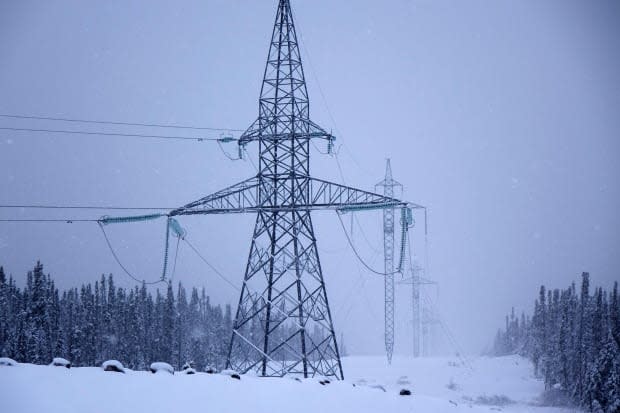How a decision by a jury in Maine could affect energy relations between Quebec and N.L

Nine jurors in Maine have opened the door for a new energy corridor between Quebec and New England, which experts say could be good news for Newfoundland and Labrador.
The jury ruled that a referendum held in the border state — in which 59 per cent of voters sided against allowing Hydro-Québec to build a transmission line through its land — was unconstitutional.
Quebec's major utility company is touting that as a win, but experts in the province say it's more complicated than that. While some variation of the plan has been in the works since 2008, there's now doubt whether the deal will even be viable in a few years.
Hydro-Québec's energy surplus is projected to disappear by the end of 2026, hampering the ability to export power to New England after the parties involved already spent about $500 million on the project.
"They worked hard to obtain [the Maine deal], but now the current government has recently switched its position," said Pierre-Olivier Pineau, a professor and researcher in energy policy at HEC Montreal. "Now it seems they don't want to export electricity anymore. They want to keep it for our own purposes and industrial development. So they've really switched their discourse."

That could be good news for Newfoundland and Labrador.
For one, Pineau said, the construction of transmission lines opens possibilities for all energy producers, just by making different markets more accessible. Secondly, he doesn't see any way Quebec can meet its obligations to New England without importing more power from Newfoundland and Labrador.
The two provinces are currently renegotiating the Churchill Falls contract from 1969 — which provided Quebec with copious amounts of cheap hydroelectric power, while infuriating Newfoundlanders and Labradorians for decades. That deal is up in 2041, but has to be renegotiated well ahead of time so both sides can plan for the eventual outcome.
Searching for win-wins
For Quebec, a future without Churchill Falls would almost certainly mean building new hydroelectric dams just to meet domestic demand, let alone export demands.
A future with Churchill Falls could see Quebec buying more power from Newfoundland and Labrador at a renegotiated price.
"It's better for Newfoundland if the [Maine] deal is signed and going on," Pineau said of the negotiations.

But it's possible the new transmission line could also help Quebec's side in the negotiations, said Éloïse Edom, a research associate with an energy institute at École Polytechnique in Montreal.
It could give Newfoundland and Labrador a potential avenue to sell excess power from the beleaguered Muskrat Falls project, which was pitched to the people of the province as a way to gain energy independence from Quebec. However, since the only year-round option for exporting excess energy to New England is routed through Quebec, that might lend some leverage to la Belle Province.
Negotiations aside, Edom sees it as a win-win for both sides.
"They need some opportunity to export energy because right now the production is higher than the needs of the province," she said. "So this could be a good way to use this electricity, make money with it and help solve the financial trouble caused by this [Muskrat Falls] project."

Significant for decarbonizing
When you set aside years of bad blood between the two provinces, Pineau said, cooperation is also necessary for the greater good of Atlantic Canada and New England.
Everyone wants to get away from coal- and fuel-fired power plants and move toward decarbonization. The best way to do that is with a strong, interconnected hydroelectric supply that crosses provincial and international borders, he said, with the ability to transfer power where and when it's needed.
But both experts warn that when it comes to energy policy, there's possibilities and then there's politics.
"When you look at the electricity system and the energy system, more often the problem is not technical, it's political," Edom said. "It will depend on the ego ... of the people in the negotiations."

When asked about the potential benefits from the New England transmission line, a spokesperson for the Newfoundland and Labrador government said there's "strong interest in determining the full economic potential of the Churchill River."
The province has assembled an expert team to have "high level" discussions with Hydro-Québec about mutual areas of interest.
One of those areas could be Gull Island — which sits between Muskrat Falls and Churchill Falls. Pineau believes the only way for that project to proceed is with a combined effort from both provinces.
Talks on the Churchill Falls contract got underway in St. John's in February. Those meetings ended with an agreement that the original deal was a bad one, and that the best way forward was together.
"We cannot rewrite the history, but we can shape the future together," Quebec Premier Francois Legault said at the time.


